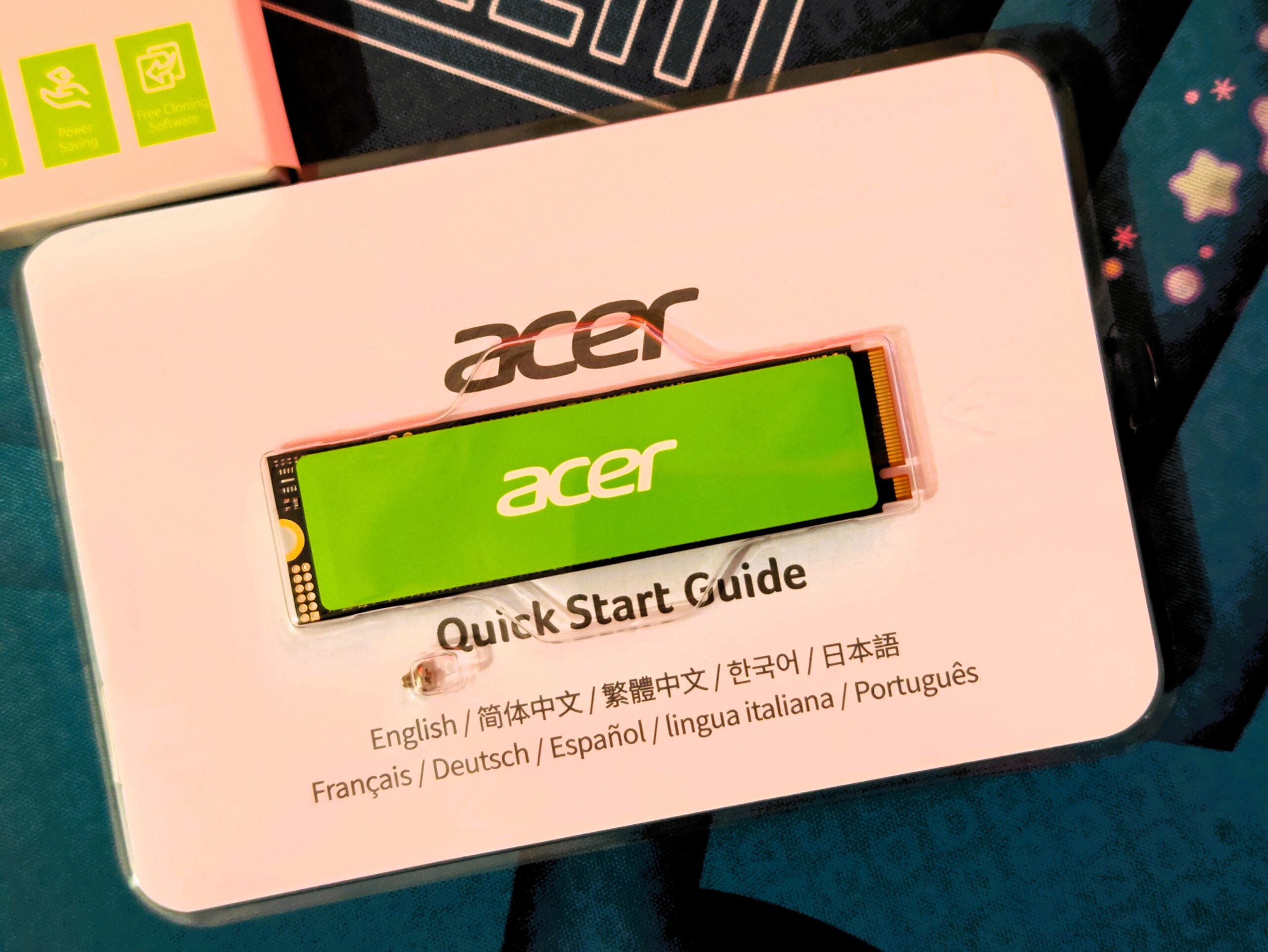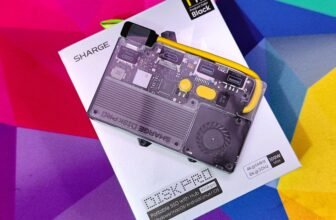When it comes to storage solutions that push the boundaries of speed and reliability, the Acer FA200 stands out as a formidable contender. Engineered for gamers, content creators, and power users, this PCIe 4.0 SSD is built to deliver blistering performance. At the heart of the FA200 is a high-performance controller paired with premium NAND flash, ensuring not only rapid data transfer rates but also long-term durability.
With an NVMe 2.0 interface, the drive achieves a remarkable sequential read speed of up to 7200 MB/s, making it one of the fastest options available in the market. Its single-sided M.2 2280 design offers wide-ranging compatibility, from desktops and laptops to the PlayStation 5, positioning it as an ideal choice for anyone looking to enhance their storage capabilities.
In today’s review, we’ll be diving deep into the Acer FA200, a high-end NVMe SSD generously provided by Acer/Biwin for testing. We’ll explore its real-world performance, assess its design and build quality, and determine how it stacks up against other SSDs in its class. Whether you’re looking to upgrade your existing system or build a new one from the ground up, this review will give you all the insights you need to decide if the Acer FA200 is the right choice for your storage needs.
Unboxing
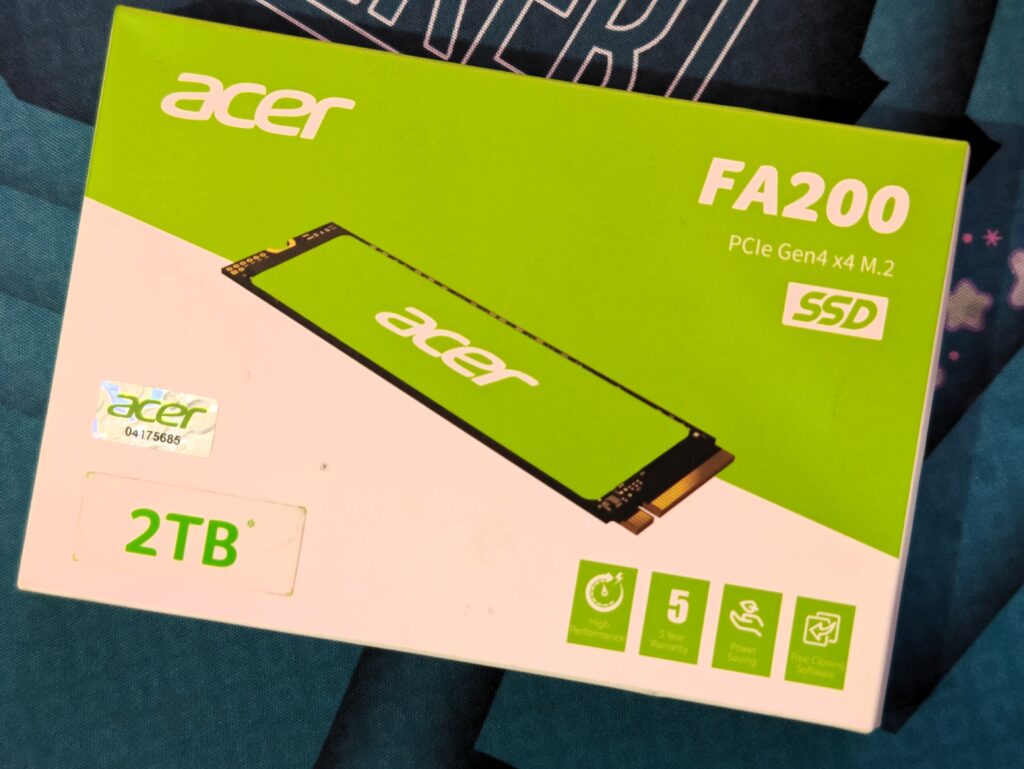
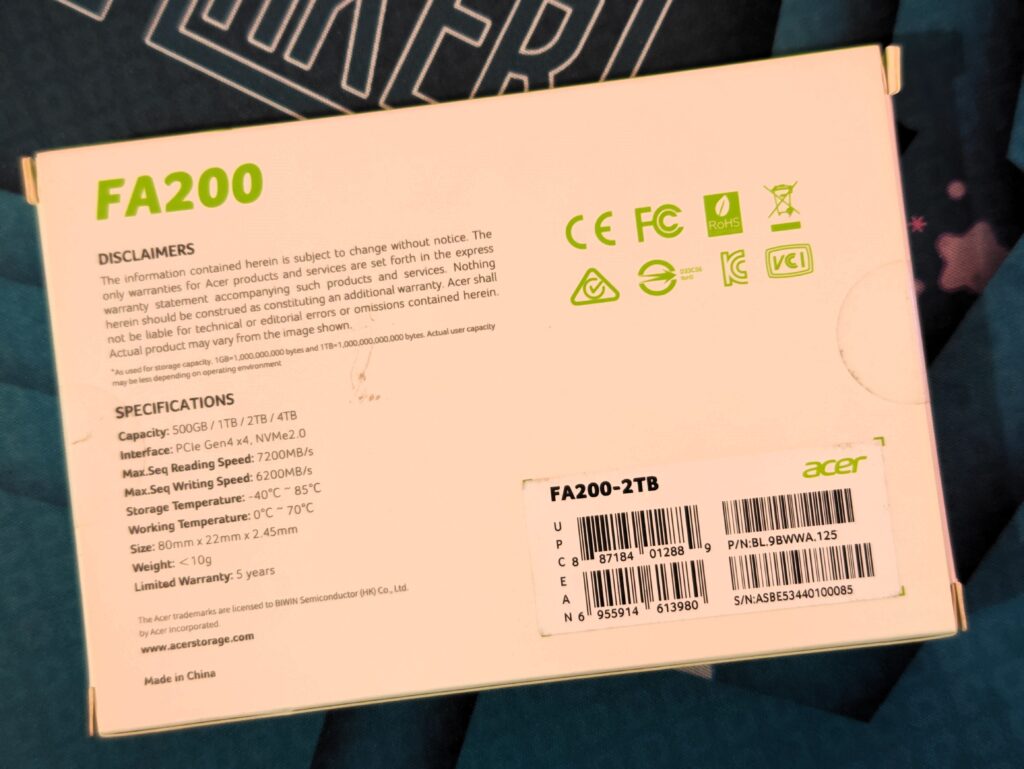
The product is packaged in a white and green box, with the front showcasing an image of the SSD along with its capacity, warranty period, and several manufacturer seals. The back of the packaging provides additional brief information and a description of the SSD.
After removing the top packaging layer, you’ll find the drive securely placed within a transparent plastic mold, ensuring it stays fixed during transit. Alongside the SSD, the package includes a screw for installation and a Quick Start Guide to help you get started quickly and easily.
Closer Look
On the front side of the SSD, a prominent sticker featuring the Acer logo immediately catches the eye. However, this isn’t just a simple branding element—it’s a sophisticated graphene thermal pad designed to aid in heat dissipation. The use of graphene, known for its exceptional thermal conductivity, ensures that the SSD maintains optimal temperatures even under heavy workloads. This clever integration of functionality with aesthetics highlights the attention to detail in the SSD’s design. On the reverse side, the drive features an additional sticker that provides essential details such as serial numbers and the SSD’s code name, adding a layer of traceability and authenticity.
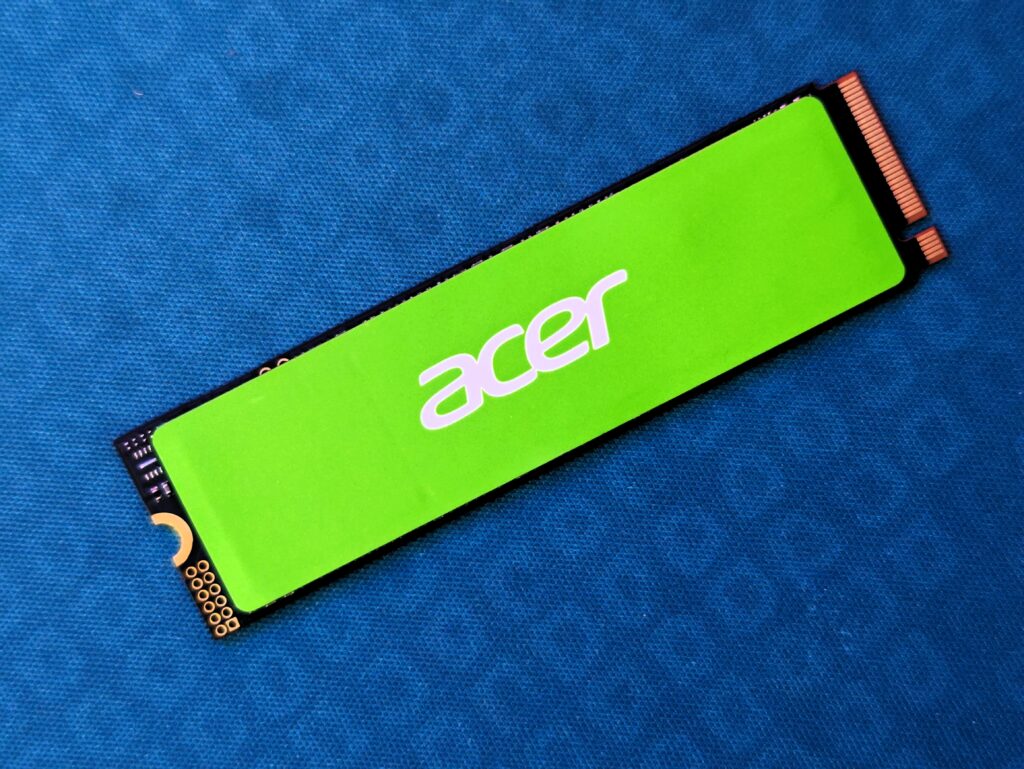
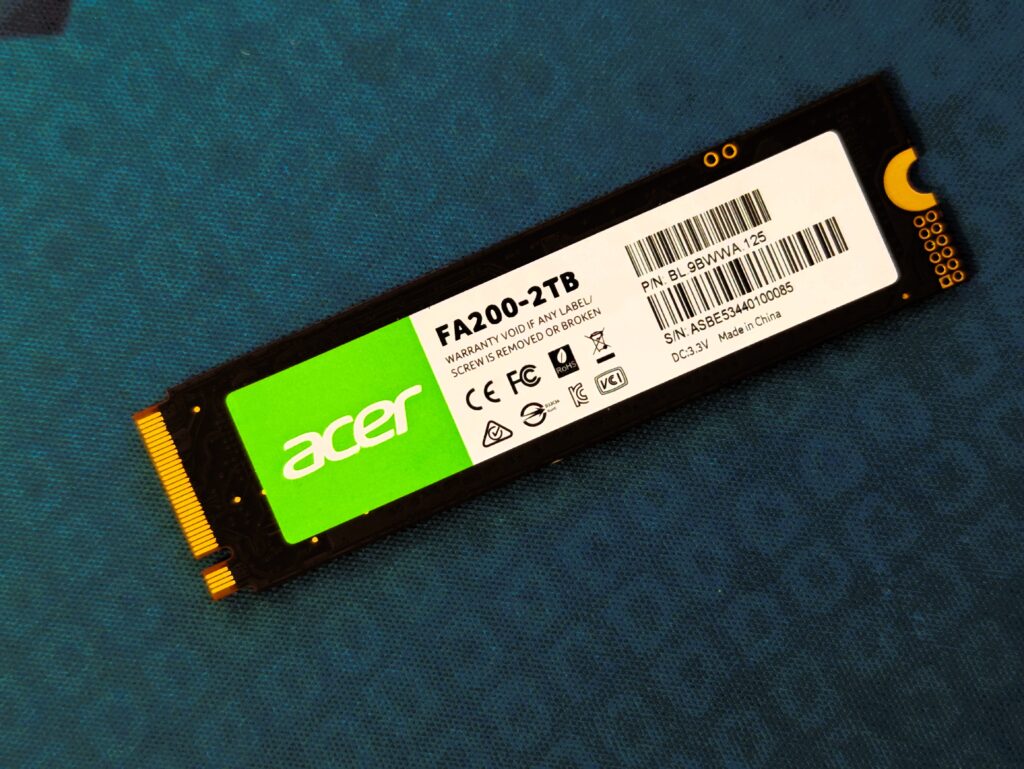
The SSD conforms to the widely adopted M.2 2280 form factor, making it compatible with a vast range of modern devices, from laptops to desktops. This versatility ensures that the FA200 can be easily integrated into most systems without any physical compatibility issues. Additionally, Acer has included a free digital version of Acronis software, available for download from the Acer Storage website. This software facilitates the seamless migration of data and the operating system from an older drive to the new SSD, streamlining the upgrade process and ensuring that users can quickly and efficiently transition to their new storage solution.

After peeling off the top sticker, the SSD reveals a single-sided design, meaning all of its components are located on one side of the PCB, regardless of the capacity. This design choice significantly aids in cooling efficiency, as it allows for better heat dissipation from the active components. On the front of the PCB, you can clearly see the key components: the controller chip, four NAND Flash modules, the Power Management Integrated Circuit (PMIC), and various Voltage Regulation Module (VRM) components. This layout ensures optimal performance and stability, while the single-sided configuration simplifies the drive’s thermal management.
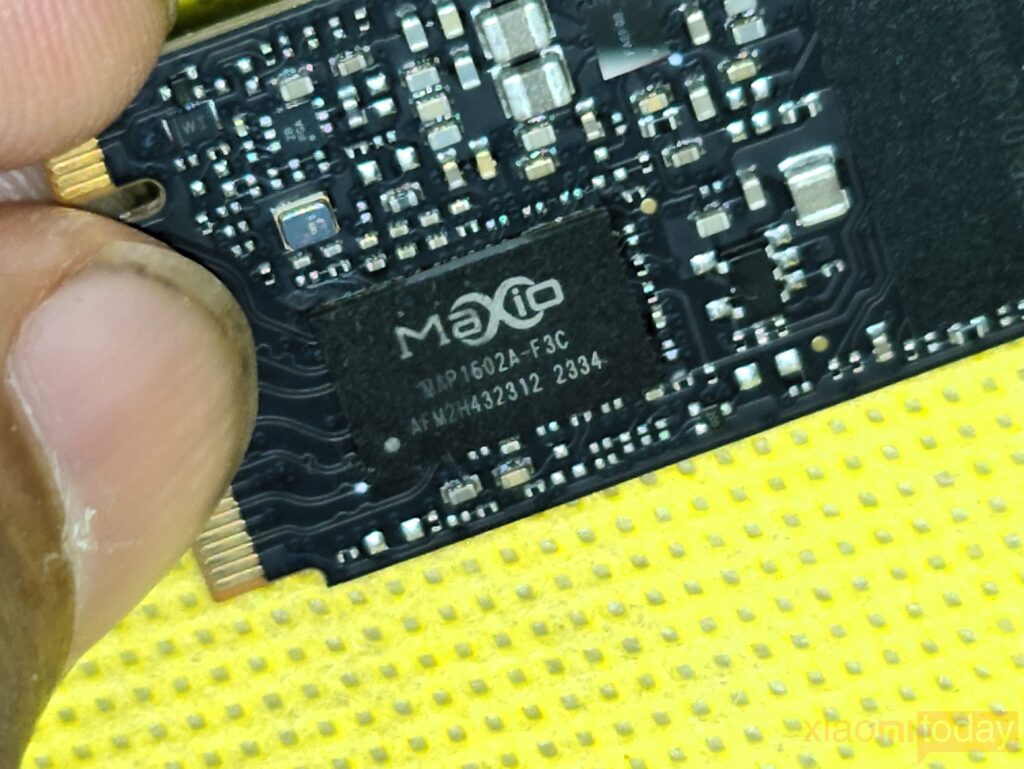
This SSD is equipped with a MaxioTech MAP1602A – F3C controller and a 32-bit ISA ARM design featuring four Cortex® R5 cores. It is manufactured using TSMC’s 12nm process. This setup is on par with controllers from well-known brands like Phison and Silicon Motion. Notably, the MAP1602A – F3C is a DRAM-less controller, relying on Host Memory Buffer (HMB) technology to manage metadata tables. It supports four communication channels with a bus speed of up to 2400 MT/s, setting it apart from other Gen4 DRAM-less controllers that typically cap at 1600 MT/s. Additionally, it can support up to 16 dies through “Chip enable” commands, allowing for direct physical connections to the NAND dies, which themselves operate at 2400 MT/s.
Every high-end SSD that seeks to deliver consistently high performance requires a buffer to store its mapping tables, such as the Flash Translation Layer or Look-up Table. This buffer is crucial for enhancing random performance and responsiveness. However, since this SSD uses a DRAM-less controller, it lacks a dedicated DRAM cache. To compensate, it allocates 40 MiB of the system’s RAM to store the metadata table, which helps speed up access and maintain efficient operation.

The 2TB SSD features four NAND flash chips, identified as “BWN0AQF1B1HCAD,” which are rebranded by BIWIN. Biwin, the official OEM, is responsible for manufacturing the PCBs used in SSDs for both Acer and HP. These NAND chips, produced by the Chinese manufacturer YMTC, are X3-6070 QLC models with 1Tb (128GB) dies. They incorporate 232 layers of data storage and 253 gates, resulting in an array efficiency of 91.7%. Specifically, of the 253 layers present in the SSD, 232 are utilized for storage, contributing to this high efficiency.
In this SSD configuration, each NAND flash chip comprises four 1Tb dies, delivering a total density of 512GB per chip and aggregating to 2TB across all chips. These NANDs interface with the controller through a maximum bus speed of 2400 MT/s, enhancing overall performance. Each die is structured with four planes, which facilitates increased parallelism and improved performance during access operations. At the time of analysis, these new QLC dies from YMTC are among the fastest QLC dies available.
Benchmark Test
Next, we will conduct a thorough performance analysis of the Acer FA200 SSD using both benchmarking software and real-world data transfer scenarios. The tests will be carried out on a system equipped with an Intel® Core™ i7-13700K processor and an MSI MPG Z690 FORCE WIFI DDR5 motherboard. To evaluate the SSD’s performance, we will utilize several industry-standard benchmarking tools.

In this test, the Acer FA200 2TB SSD will be installed in the first M.2 slot of the motherboard. This slot is directly connected to the processor and supports PCIe4.0×4 transmission technology, which can ensure that its performance will not be affected by other hardware. At the same time, in order to test the temperature performance of the solid-state drive and the heat dissipation effect of the radiator, the aluminum alloy radiator that comes with the motherboard will not be used for testing.
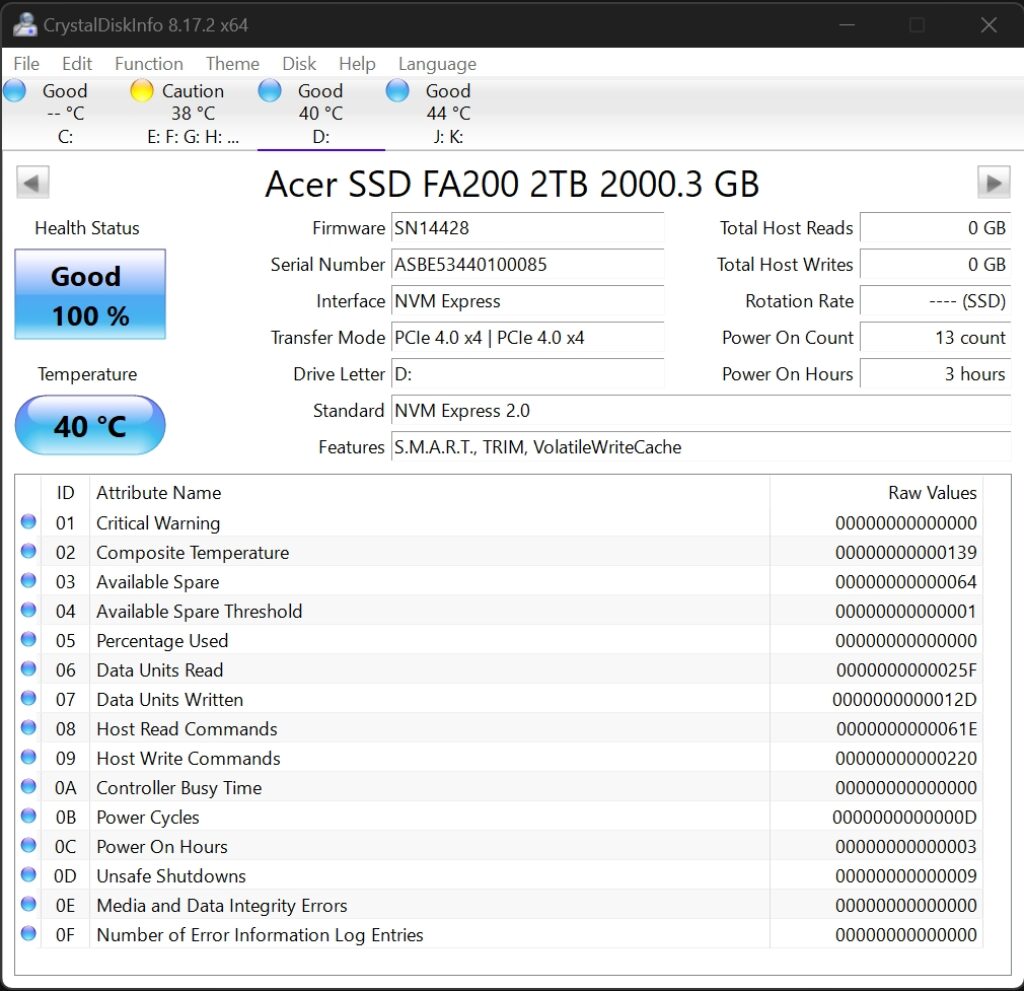
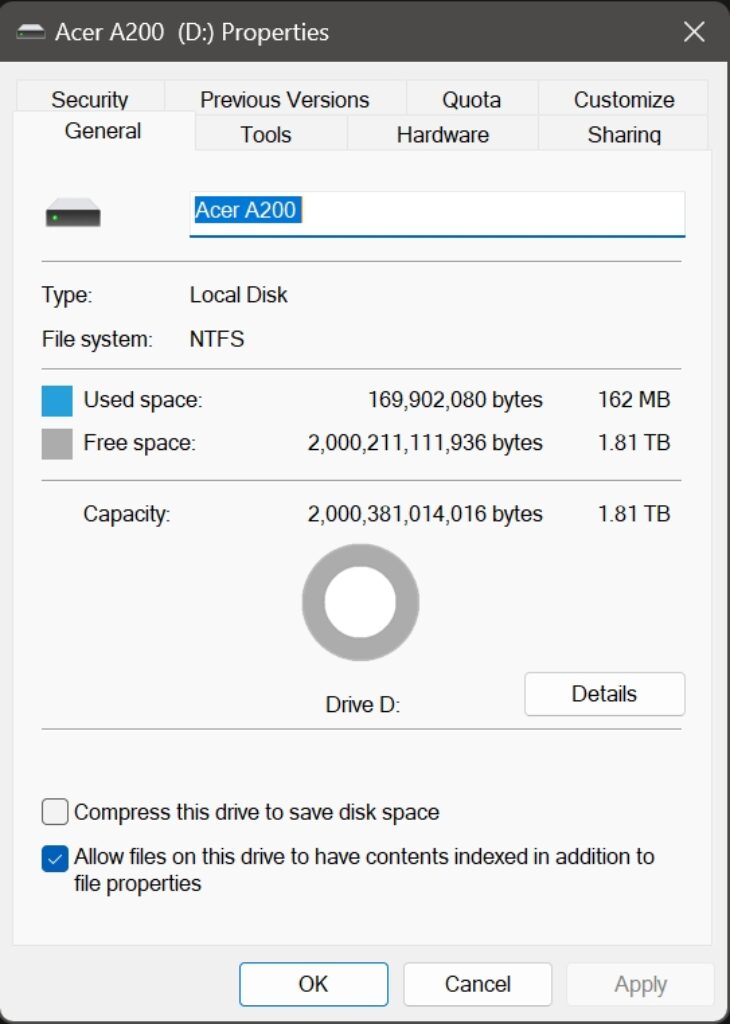
According to CrystalDiskInfo, the Acer A200 SSD operates in PCIe 4.0×4 mode and adheres to the NVMe 2.0 technical standard. It supports features such as SMART, TRIM, and VolatileWriteCache. The 2TB version provides 1.81 TB of usable storage space. All subsequent benchmark performance tests were conducted on an empty disk.
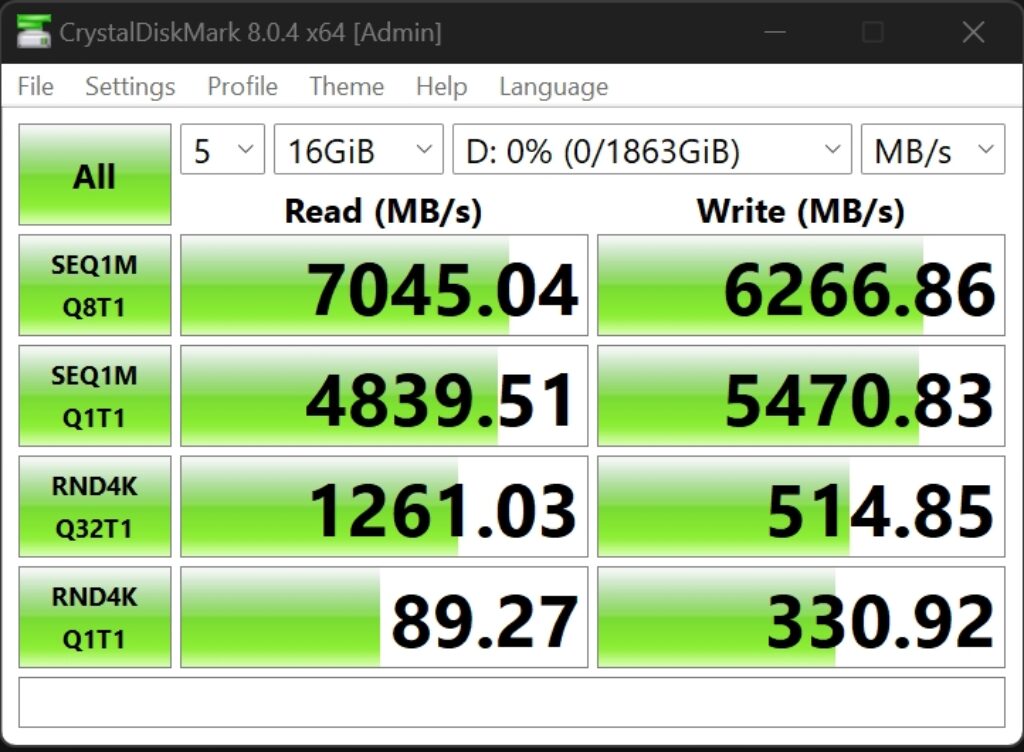

Using CrystalDiskMark benchmark software, the Acer A200 SSD demonstrated impressive performance, achieving sequential read and write speeds of 7045 MB/s and 6266 MB/s, respectively, aligning with the manufacturer’s specified ratings. Additionally, the 4K single-thread random read and write speeds were recorded at 89 MB/s and 330 MB/s. The drive also delivered exceptional random read and write speeds, reaching 30,77,53.66 IOPS and 13,35,42.48 IOPS, respectively.
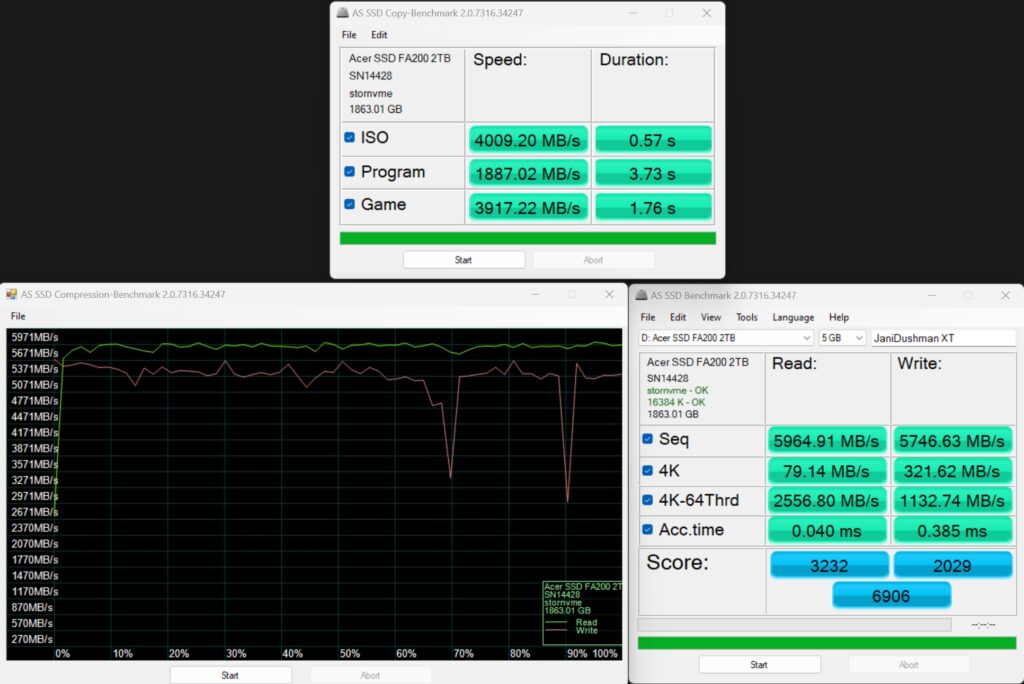
The Acer A200 delivers outstanding performance in the CMD benchmark test, ranking among the best. In the AS SSD Benchmark test, it achieves sequential read and write speeds of 5964MB/s and 5746MB/s, respectively. Additionally, its 4K single-thread random read and write speeds are 79MB/s and 321MB/s, culminating in an impressive total score of 6906 points.
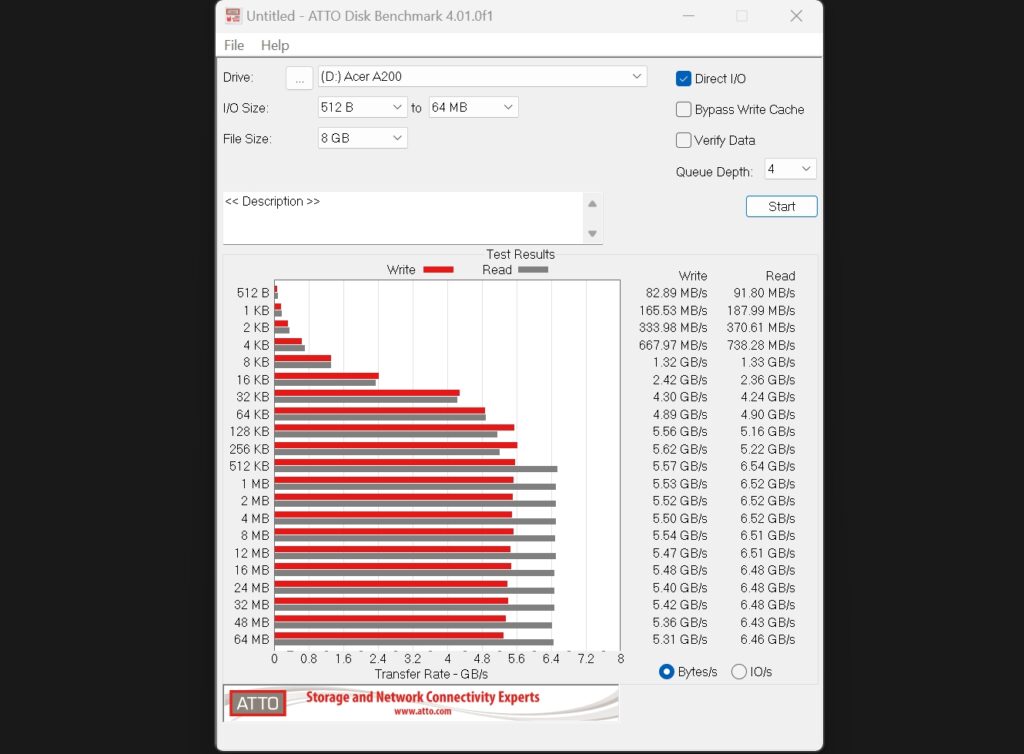
The ATTO Disk Benchmark software evaluates the read and write performance of the Acer A200 by testing data packets of varying sizes, from 0.5KB to 64MB. For smaller files, such as 4KB, the read and write speeds are 738MB/s and 667MB/s, respectively. When the data size exceeds 512KB, the device reaches its maximum performance, achieving read and write speeds of up to 6.54GB/s and 5.57GB/s, respectively.

In the HD Tune benchmark software, configure the file benchmark mode with a file length of 150GB and set the data mode to mixed. This setup simulates continuous reading and writing of 150GB of data on the SSD. When the disk is empty, the SLC cache exceeds 150GB, resulting in a consistent reading speed of approximately 6.1GB/s and a writing speed of 5.7GB/s, with no performance degradation during the process.
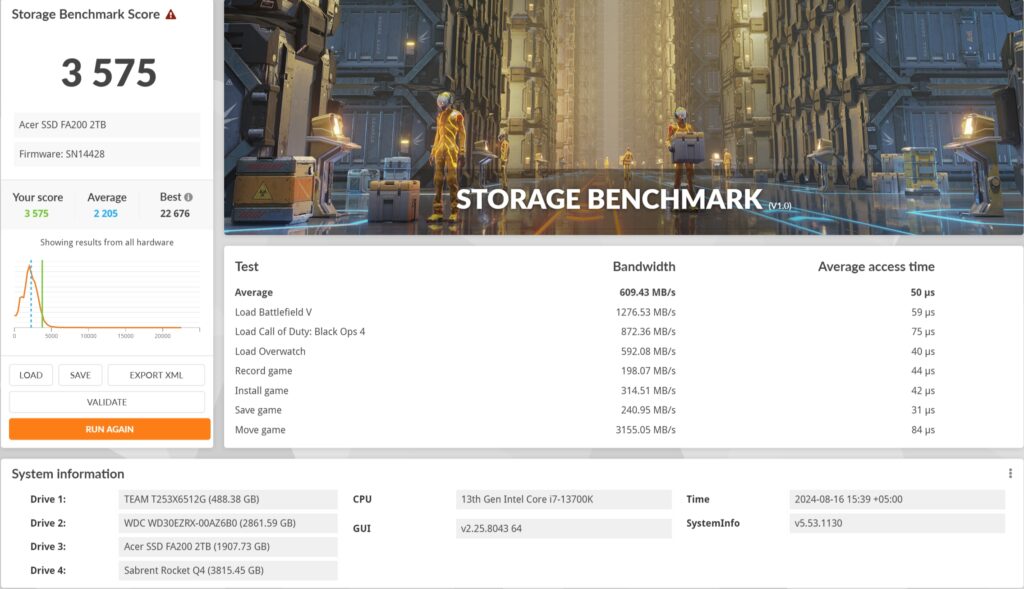
To evaluate the performance of the SSD drive in gaming scenarios, the 3DMark benchmark software was used, specifically focusing on storage benchmarks. These tests simulate various gaming-related tasks, including game installation, loading, and video recording. The Acer A200 achieved a test score of 3,575 points, with an average bandwidth of 609.43 MB/s and an average access time of 50 microseconds. Additionally, the drive’s bandwidth for mobile gaming scenarios reached 3,079 MB/s.
Gaming Performance
High read and write speeds are crucial for reducing loading times in games, and enhancing the overall gaming experience. For instance, in the “Final Fantasy 14” Benchmark, the loading time is a swift 5.178 seconds. Similarly, the open-world game “Forspoken,” also by SQUARE ENIX, showcases impressive visual effects, although its plot may not be as engaging. The game’s built-in Benchmark function measures both loading time and frame rate, with the first city scene loading in just 0.663 seconds and even the more complex bush scene taking only 1.407 seconds.
Beyond the impressive benchmark scores, the real-world performance of solid-state drives (SSDs) significantly impacts gameplay, especially in large-scale open-world games like “PUBG,” “Forza Horizon 5,” “Elden Ring,” and “Monster Hunter: World.” These games require constant background loading of scene data as players navigate expansive environments. For example, in “Forza Horizon 5,” players driving at high speeds rely on fast SSD read speeds to prevent issues like “insufficient streaming bandwidth” warnings or the sudden appearance of on-screen elements such as trees or buildings. With high-performance SSDs, like the Acer A200, gameplay remains smooth and uninterrupted, ensuring a seamless gaming experience.

